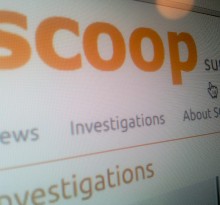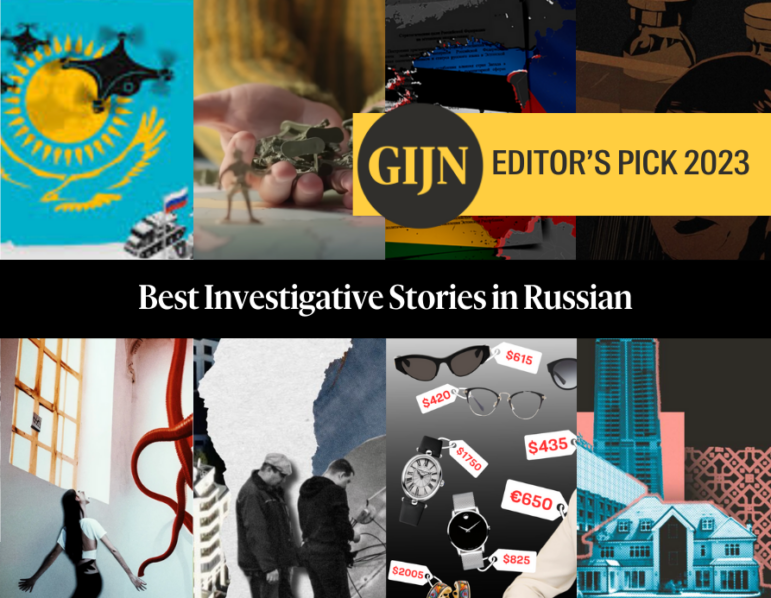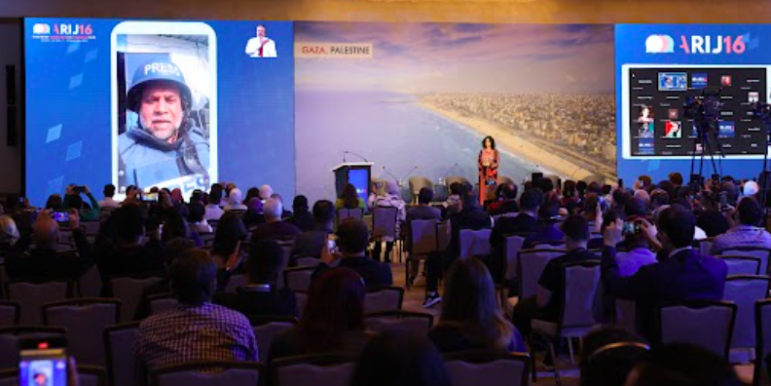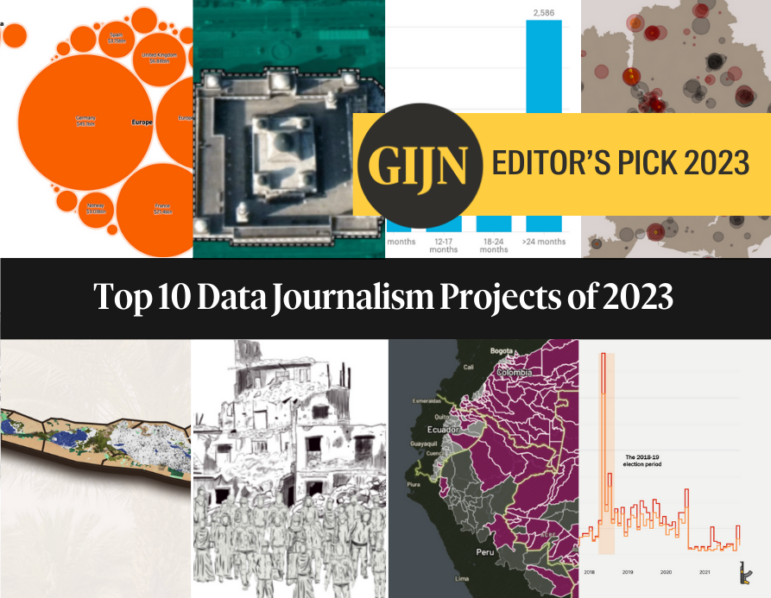

SCOOP Celebrates 10 Years
Longtime GIJN member SCOOP, based in Denmark, is a cross-border network of investigative journalists who help fund projects, connect reporters for collaboration, and organize conferences and trainings. On SCOOP’s 10th anniversary, our colleagues there put together an impressive list of activities, awards, and events, which we’re reprinting here in full. You can subscribe to SCOOP’s newsletter here.
 This year SCOOP celebrates its 10th anniversary. Since 2003, the network of investigative reporters has collaborated on projects spanning Eastern Europe, the Balkans and Russia, Central Asia and North Africa. Its first meeting was 10 years ago this month is a snow-covered Kyiv, where the team launched its pilot project.
This year SCOOP celebrates its 10th anniversary. Since 2003, the network of investigative reporters has collaborated on projects spanning Eastern Europe, the Balkans and Russia, Central Asia and North Africa. Its first meeting was 10 years ago this month is a snow-covered Kyiv, where the team launched its pilot project.
SCOOP has supported more than 400 investigations, won numerous awards, and organized two regional and one global conference.Since then SCOOP has expanded from Ukraine to the Balkans, the Caucasus, Russia, Moldova, Belarus and Central Asia. It has supported and worked with sister operations Arab Reporters for Investigative Journalism and the Programme for African Investigative Reporting.
At that first meeting reporters discussed how to publish stories that would expose corruption, organized crime and abuse of power. They thought news outlets would back away.
But to their surprise, that was rarely the case. Over the years the team found most editors willing to run stories developed with financial support from SCOOP. The idea had been a sound one – support journalists who had good ideas but no resources.
SCOOP will spend little time celebrating. The nonprofit, funded by the Danish and Swedish foreign ministries and by private foundations, is struggling to continue supporting operations in core regions – the Balkans, Ukraine, Caucasus, Moldova and Belarus. This year the group, with help from the Danish funder International Media Support, will focus on raising money while continuing to help reporters dig into important stories that need its support.
In Other News
Russia bars Ukrainian journalist for 5 years
The Russian Federation has denied the Ukrainian journalist Oleg Khomenok entry into the country for the next five years.
Oleg Khomenok is the national coordinator for SCOOP in Ukraine and has also assisted colleagues in Belarus, where he was refused entry at the border in March 2012. Mr. Khomenok was also refused admission into the Russian enclave Kaliningrad in September, where SCOOP was holding as seminar.
A short notice from the “Federal Security Service of the Russian Federation” refers to an article 27 which states that “Entry into the Russian Federation for a foreign citizen or a stateless person is not allowed in the following cases: 1) it is necessary in order to ensure the defense or national security, or public order, or the protection of public health”.
The Danish Association for Investigative Journalism has protested to the Russian authorities, stating that investigative reporting is no threat to Russian “national security, public order or public health”.
Awards
Chief Doctor Exposed
Just a few days before the Ukrainian conference mentioned above, the Ukrainian reporter Oleg Peretyaka was awarded the “Silver Pen” by the National Union of Journalists in Ukraine for his investigation of a criminal hospital manager/doctor. He was nominated by the union’s branch in Crimea. Read the investigation
Several Awards for SCOOP Russia-supported Reporters
One of the newest SCOOP regions, Russia, can boast of several awards for the stories, which were supported by the first round of SCOOP grants.
Svetlana Sinitsyna from Archangelsk has won several prizes for her investigation “The Kaninsky Deadlock”. The story is about the Nenets, a small people who live in the tundra and have their own lifestyle. But alcoholism is taking a heavy toll on the small societies. The film was awarded a prize from the Archangelsk Union of Journalists called “Zolotoe pero Severa” (Gold Feather of the North) and won the first prize in the category “Television Program” of the Northern Character Festival 2012.
Reporter Lina Zernova received the Artyom Borovik prize for investigative journalism, which is awarded annually in Moscow.
The jury decided to give the award to Lina Zernova for her investigation “The Gulf of Finland: Who Will Solve the Mystery of the Cesium Anomaly?”. It was published on the web-site of the environmental NGO Bellona and in the Gorod magazine.
UN Prize to Armenian Reporter
Marianna Grigoryan’s story “Home Abortions Destroy Young Women”, which was supported by SCOOP, has been awarded a special prize by the UN Armenian office. Though the article did not cover the topic of the UN Journalism Award contest, namely, the UN activities, the jury decided to grant a special encouraging prize to the article.
The same story won second prize the Eastern European Journalism Awards on December 1 in Warsaw. Another SCOOP-supported story was among the finalists in the contest. The investigation ”Business in the name of God” by Moldovan journalists Nicolae Cuschevici, Victor Mosneag and Tatiana Etco was among 11 finalists and revealed how Moldovan priests are taking advantage of the people’s trust and getting directly involved in business or turning priesthood into trade.
Awards to PAIR investigation in Burkina Faso
The big winner of Galian 2012 in Burkina Faso is Rachelle Somé from Radio Pulsar. At this competition the best works of journalists in Burkina Faso in 2011 were awarded.
Her work “Schools without school girls in the Sourou” won the Galian in the radio broadcast category. It also won the price Samuel Tiendrébéogo of APAC (Association of professional information and communication ) and the price of the ministry of national education and literacy.The investigation was supported by PAIR and was first broadcasted September 16, 2011 on Radio Pulsare. Read more
Upcoming events
March 15-17: SKUP Conference, Norway, with Scandinavian and international speakers
May 2-5: European Data Harvest Conference, Belgium
October 12-15: Global Investigative Journalism Conference, Rio, Brazil. Contact your local investigative journalism organization for further info and travel grants.
From the World of Investigative Reporting
Investigations on Youtube
The Center for Investigative Reporting has launched an investigative news channel, The I Files, on YouTube. The channel’s goal is to become the hub of the best investigative reporting from around the world.
CIR director of digital media Sharon Tiller has partnerships with media outlets such as the New York Times, ABC News, BBC, Al-Jazeera, and the Investigative News Network, which consists of 60 nonprofit news organizations including the Pulitzer Center on Crisis Reporting, the Investigative Reporting Workshop, ProPublica, and the Center for Public Integrity. Independent filmmakers and makers of documentary clips are welcome to contribute. (Source: Editor and Publisher)
SCOOP Veteran in New Investigative Center
SCOOP veteran Brigitte Alfter has founded the Danish Center for Investigative Reporting – called Investigative Reporting Denmark – together with journalists Bruno Ingemann and Nils Mulvad. The center is independent and non-profit and will focus on investigative reporting and access to information.
Interest for Investigative Grants Doubled
A total of 41 applications were filed for Journalismfund.eu’s September 2012 application round, more than double the average number of applications that were filed in previous rounds. A total of 77 journalists applied individually or as a team. Now for the first time, significantly more men than women applied: 50 versus 27.
A Study of Investigations
UNESCO (The United Nations Education, Science and Culture Organization) released the “Global Casebook of Investigative Journalism” in September. The publication contains 20 investigative reports on topics ranging from the environment, social issues and health to drug trafficking and the War on Terror. The investigations come from around the world, and the articles are supplemented by comments and experiences from the authors.
The book is free and can be found at the Unesco website.
Learn to Code – Write your Own Programs
Many journalists would be more efficient and able to make a new kind of stories, if they knew how to code. Lisa Williams has made a list of programs for self-study – especially with journalists in mind.
More Support Needed for European Investigations
Can investigative journalism help to detect fraud and corruption with EU funds? That is the focus of a new study presented at the European Parliament on 9 October 2012. It was requested by the Parliament’s Committee on Budgetary Control and executed by Margo Smit for the Belgian Pascal Decroos Fund.
The recommendations it eventually makes are multifaceted but clear-cut: both European and national policymakers should do more to support and facilitate investigative journalism if they want to enlarge its role in tracing irregularities and fraud. Read more
SCOOP/PAIR Investigations
Croatia’s Richest Man under Scrutiny
How did Ivica Todorić become so powerful? He is the richest man in Croatia, but seldom in the public eye and very rarely critized. He is the owner of the Agrokor Group, the biggest manufacturer and retail vendor of food in Croatioa. The group also has a big influence on gas companies, mobile operators and publishing. Croatian journalist Saša Paparella measured his reach. Read more
EU Countries Sell Banned Asbestos to Croatia
Asbestos is called “the silent killer”. It has been strictly banned in the EU since 2005 – to produce it, to sell it, to use it. Croatia adopted the same regulations a year later. But since then, asbestos has been imported to Croatia at least 275 times, and most of it came from EU countries. Read more
Pulling out of the Balkans Media Market
The German media company WAZ is one of the strongest in Europe. But its entry in the Balkans was not so easy. The work of WAZ in Serbia and Croatia is marked with media companies in debts, nontransparent business practice, ties to tycoons close to the state, tight connection with the governments, obsolete editorial policies and partially fulfilled contractual obligations. Reporters Ilko Ćimić and Žarka Radoja researched the issue. Read more
The FAIRTRADE chocolate rip-off
The pictures of happy African farmers on the FAIRTRADE chocolate are designed to make the consumer believe that the broad smiles are a result of actual fair trade: support and a better income. But this impression is false. In a six-month transnational investigation by journalists from Ivory Coast, Ghana, Cameroon, Nigeria and the Netherlands investigated the alleged benefits received by cocoa farmers in West Africa via the FAIRTRADE label.
Their conclusions: whilst the chocolate consumer in the West pays a significant mark-up for ‘honest’ chocolate, these benefits amount to little or no improvement in the lives of cocoa farmers. In some case, because of FAIRTRADE cooperatives’ increasing dominance, farmers were even worse off than before. Read more
A transnational investigation – Deadly borders of West Africa
Increasingly, West African borders have become notorious for all sorts of crime from almost every corner of the sub-regional borders; extortion racketeering and corruption are the order of the day at all the borders in the ECOWAS region. The borders of West Africa have been turned into illegal money-making ventures which rake in thousands of Ghana cedis, Nigerian naira and CFA francs for the security agents positioned there. The issues was investigated by Kwabena Adu Koranteng (Ghana) and Ouamar Abdulai (Burkina Faso). Read more
Death in the quest for gold
Thousands of nationals of the West African sub-region (Malians, Ivoirians, Guineans, Burkinabes) all converge in large numbers daily at the Côte d’Ivoire-Mali border in search of gold, with the aim of making a fortune. While some of those “illegals” manage to succeed, it is not always the case for many of them, who return empty-handed. Worse, unlucky ones sometimes lose their lives there when mudslides occur. Read more
Subscribe to SCOOP’s newsletter for the latest.









